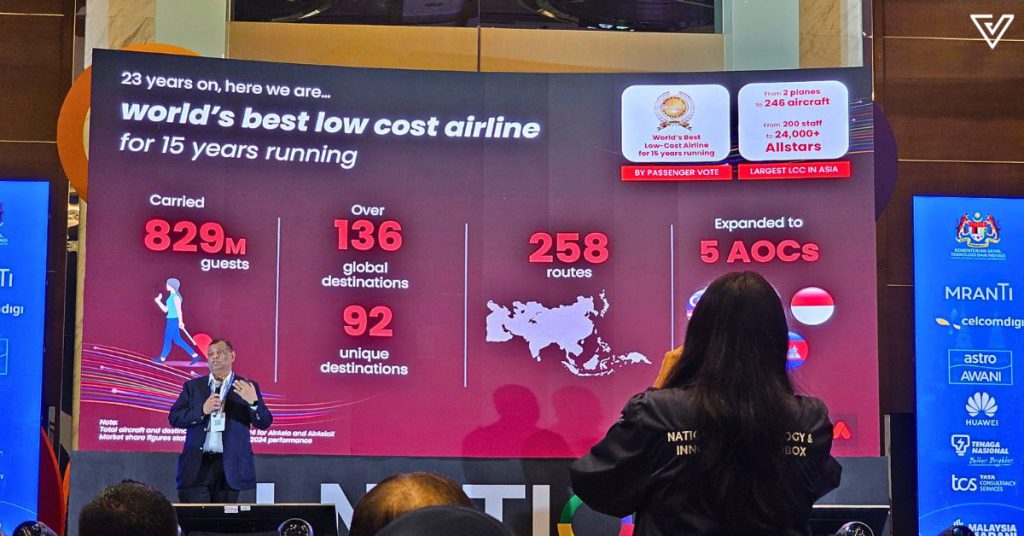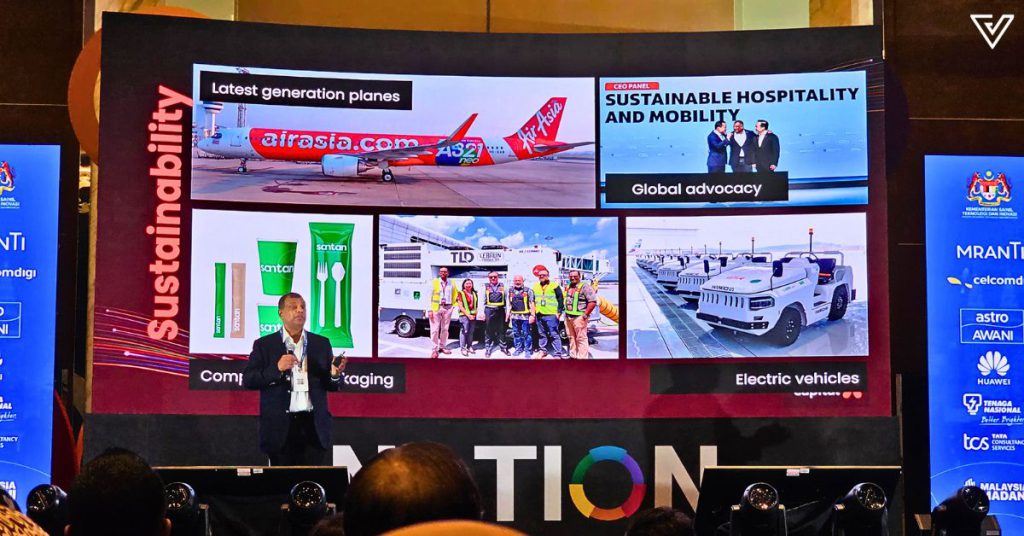Say what you want about AirAsia and Tony Fernandes, but it’s hard to deny that he’s built a company with solid branding and a strong company culture.
He’s grown Capital A’s portfolio from one airline brand to span seven core verticals—aviation, logistics, engineering, aviation services, digital lifestyle services, fintech, and even brand management.
And I’m sure many of us are familiar with their AllStars.
Personally, I’ve never had the opportunity to listen to Tony speak at business events, so I was anticipating his keynote speech at MRANTI’s I-Nation 2024.
Glad to say, it didn’t disappoint.
While I can find all sorts of analyses and theories online on what drove AirAsia’s growth, it’s not the same as hearing it from the horse’s mouth.
Here’s what Tony said has been AirAsia’s biggest assets for growth.
1. “The number one asset in your company is your staff.”
Employers worth their salt will know this. In the service industry, this is all the more important, as happy staff usually mean happy customers too.
This isn’t to say that layoffs don’t happen at AirAsia, nor can we forget how the 2021 F-bomb controversy was initially handled.
But in many cases, AirAsia also tries to retain its staff where it can, moving them to positions that fit them better. Vulcan Post covered one such example of this in 2020.
And Tony shared that they continue to do so, with dispatch riders becoming first officers, ramp officers becoming data analysts, and cabin crew becoming captains and even flight instructors within the company.
2. A firm belief in the saying “data is king”
According to Tony, he didn’t foresee the data revolution. He simply wanted to know his customers better and alleviate their pain points while travelling. So he looked at the data, and it showed him only 6% of Malaysians were flying at the time.

That’s how AirAsia came to be, allowing more Malaysians to enjoy the perks of low-cost flying. Similarly, during the pandemic, when planes were grounded, Tony saw another opportunity when he learnt that only a low percentage of Malaysians were using courier services.
If AirAsia was able to make the service more convenient and accessible, just like they did low-cost flights, demand would grow. Combined with the extra cargo space they had while planes were grounded…
Boom, Teleport was born, and it grew into a US$50 million business in two years. Next year, they hope to achieve five million parcels shipped per day. They also started a courier service that’s already expanded to Singapore and is eyeing Thailand next.
3. A good, big pool of funds for branding
Tony’s a firm believer in putting money into making sure his brands stand out.
This has led to the success of Santan, their in-house F&B brand that got popular enough in the skies that they brought it down to the ground too.
They even opened restaurants under the brand, though those have since closed.
To do successful branding, you’ll need to know what your brand stands for. “If your staff don’t know your mission, how can you sell it outside?” Tony said.
4. A will to disrupt
In 2019, Tony made a huge decision. It was one that upset even his team.
He turned their airline website into an online travel agency (OTA). This meant that AirAsia’s website would actually be selling flights from other airlines, listing hotel stays that weren’t Tune Hotels’, and more.
It was a bold move, and a big risk. But he saw how people were gravitating towards sites like Booking.com and Trip.com to plan their holiday, and knew that he had to disrupt AirAsia’s status quo.
They couldn’t stay stagnant. “If you’re not ready to change, you’ll die,” he said.
True enough, that was the right move for them, allowing them to grow beyond just an airline into a digital and travel lifestyle brand, offering users e-hailing, food delivery, parcel delivery, fintech services, and more.
And he’s not done disrupting the industries they’re in yet. As a teaser at I-Nation 2024, he shared that he wants to launch loan products under BigPay, and possibly create a token or a stablecoin that can be used across Asia.
5. Innovation that comes in many forms
Perhaps some entrepreneurs get too tied up over how to bring innovation to their companies, thinking that it has to be related to mind-blowing tech.
“Innovation is more than tech, it’s about your roots and your core, how you manage your company, your people, your products,” Tony shared.
An example of innovating your products is how AirAsia introduced a direct flight from KL to Nairobi, something that Tony said has never been done before.

Doing things differently is also a form of innovation, the entrepreneur said, such as allowing their cabin crew to wear their hair however they want, and investing in the growth of female pilots (they have one of the highest ratios of female pilots and engineers in the region).
-//-
If there was one big takeaway I had that day, it would be that AirAsia didn’t get to where it was by being meek with marketing.
Even at I-Nation, Tony didn’t neglect showcasing his charismatic marketing skills.
Mid-speech, he singled out an audience member. The reason? She was wearing red, which is, of course, AirAsia’s primary colour.
For that, Tony gave her two free seats on an AirAsia flight of her choosing. Whether she was a planted audience member (I don’t think so) or if the free flights will have strings attached, I don’t quite know.
Regardless, Tony probably gained a few more admirers in the crowd then and there, and AirAsia the brand will linger in the audience’s minds for a while longer, potentially sneaking into their holiday plans too.
Read more Malaysian startup stories here.




















